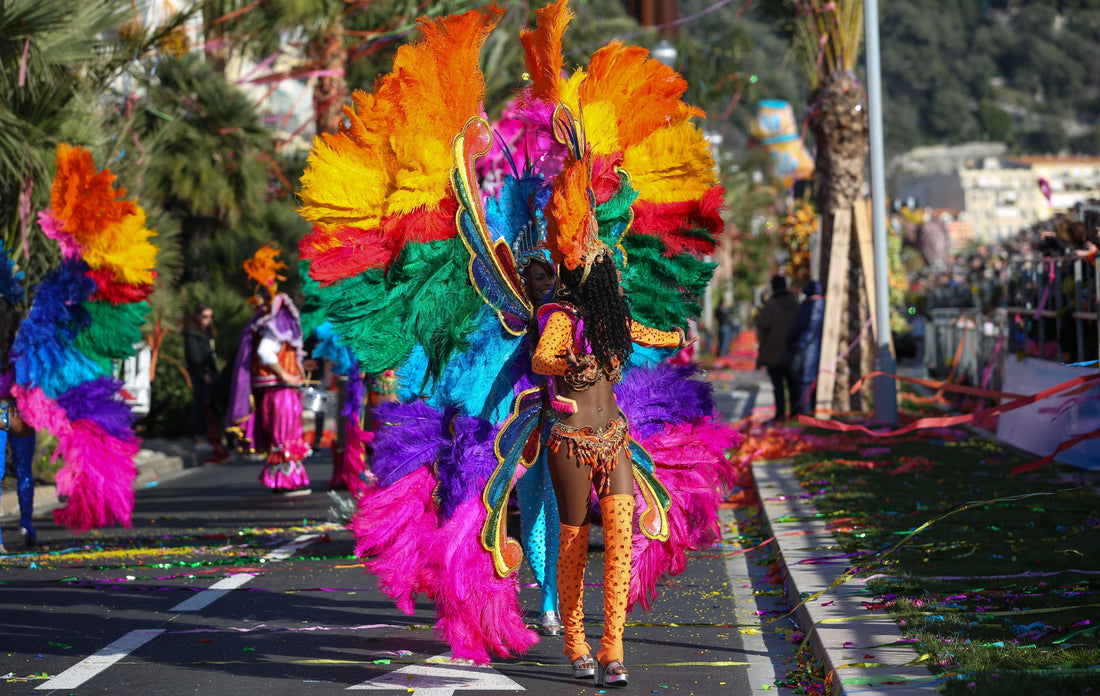
The Soul of the Streets: Caribbean Carnival as Resistance, Reverence and Celebration
Share
5-minute read Photo credit: Litchi Cyril stock.adobe.com
Author: Bardot
Introduction
To be African-Caribbean is to know that Caribbean carnivals are not just about feathers, steelpans, sequins, Soca, and seasoned food. It is a living, breathing energy of a people who took the whiteness of oppression and turned it into a blaze of righteous colour, rhythm, and joy. From Port of Spain to Rio de Janeiro, from Bridgetown to Notting Hill and more, Caribbean carnivals – Spicemas, Crop Over, Caribana, Carifest, Labour Day Parade, etc. – serve as a collective resistance dance for the descendants of enslaved peoples. They are global gatherings born from the refusal to let the Transatlantic Slave Trade and colonialism erase a people’s voice, identity, spirit, and colour.
With Notting Hill Carnival just days away, the streets of West London are ready to transform once again into a kaleidoscope of colour, history, and the token body-popping police officer. A place where meaning, mas, music, magic and macabre collide. At its core, Carnival is the greatest African-Caribbean act of visibility, freedom, and joy, and depending on through which lens you are reviewing Carnival, its impact looks vastly different for each of these four groups.
1. Mas Bands and Procession Dancers: Our Cultural Storytellers
To lead a mas band is to be a custodian of memories and a protector of musical legacies straight from the heartlands of Trinidad & Tobago. Whether performing pre-the main carnival days at a Panorama steelpan competition, at the early dawn start of J’Ouvert or throughout the procession route, these mas’ bands set the emotional tone to remind everyone – including guests not born of African-Caribbean culture – why we continue to reflect and resist.
For the procession dancers, the process begins months, sometimes up to a year, in advance. Costumes are not just ‘sexy outfits’; instead, dancers are adorned in pieces that are drawn from ancestral symbols, African-Caribbean folklore, and modern interpretations of freedom. Where artistry meets cultural activism, this is a chance for the costume designers to educate onlookers through spectacle, ensuring younger generations inherit more than just the music and great food; they inherit why we come together to celebrate carnival.
2. Carnival Attendees: Freedom in Living Colour
Whether attending for the first time or a veteran, carnival is liberation in full technicolour. Visiting a carnival in one of the Caribbean islands or another western nation evokes the same remarkable sight: swathes of crowds energetically bouncing for hours to Soca, calypso, reggae, dancehall and more that boom out from the procession trucks or multiple sound systems strategically dotted around the carnival route. I defy anyone to not get caught in the waves of joyful and bombastic chaos that capture everyone as the vibes seep deeper into everyone’s soul.
This is not the place to shrink yourself. If anything, Caribbean carnivals are about showing up in your fullest self but not full of yourself. The streets automatically become a rare public space where the Blackest of joy is not just accepted but celebrated and where class, race, gender, religion, creed and background blur into one shared vibration shouting out all manner of lyrics such as “…Real badman nuh model inna shorts / Straight jeans, cut off foot pants / Everybody haffi ask weh mi get mi Clarks…”
3. Capitalists: Desperate to Colonise and Commercialise
Where there’s culture in all her authenticity, there’s always the colonising commerce boys… waiting like vultures to take over, colonise and water things down to such an extent that they rip the soul out of the very thing that brings the community together year upon year, decade after decade.
Yes, Caribbean carnivals, like the iconic Notting Hill Carnival, require both public and private funding for staging, safety, transport and other infrastructure costs, but there are also wider tempting opportunities for corporate sponsors, tourism boards, and global brands to monetise the diversity and multiculturalism of the event without a real care for African-Caribbean people, who are the only true guardians of carnival.
If carnival is rooted in emancipation, we cannot trust those who are desperate to sand down the raw political edge that birthed these celebrations. If they could, capitalists would shift the soul of carnival – including location for some – stripping it of its roots and cultural importance to remodel it into a palatable afternoon stroll at the park full of vanilla-esque identikit artisan stalls. Nope!
It is the responsibility of all of us who love and appreciate Caribbean carnivals, whether descendants of enslaved persons or not, to ensure that profit never eclipses the purpose and that the integrity of carnival remains sacrosanct. The heart and soul of Caribbean carnivals must remain in the hands of the African-Caribbean communities who created them.
4. Carnival Erasers: The Silent War on Joy
We know there are a small pocket of individuals who wish carnivals would simply disappear. Those that speak loudly of “noise”, “safety”, or “public disorder” are some of the ones that move into neighbourhoods where carnivals have been taking place for decades, only to turn around and want said carnival to be adapted or moved to align with their views. It all boils down to the same insidious something: a discomfort with Black joy taking up public space in any shape to freely celebrate our cultural identity.
Carnival disrupts the sanitised, tidy narratives of assimilation because it refuses to be invisible or quiet. In the long and painful shadow of empire, the unadulterated pleasure of Caribbean carnivals is revolutionary. To try and erase them to control everyone is a whitewashing of identity, another ugly mask of cultural colonisation that we have had to endure for far too long.
Why the Heritage of Carnival Must Be Protected
As the highest celebration of resistance that grew from Canboulay in Trinidad, where formerly enslaved Africans disguised themselves in masquerade to mock their oppressors, Caribbean carnivals should be revered, and not just in a party format. A resistance that traversed across the globe as people emigrated to seek better lives in new lands has and deserves the right to be remembered unapologetically.
You see, protecting Carnival also means rejecting the hand of colonisation in favour of historical truths and cultural identity. Because at its best, it is a vibrant reminder that African-Caribbean heritage is not a museum piece. It is an ever-evolving force – forged in fire – that demands respect, not revision or reduction through ticketing and surveillance.
For us, Carnival is the proof that our Caribbean history and ancestry did not end in chains and subjugation; it continues in the most resplendent of colours.
And Finally, Lest We Forget…
Born in Antigua on 26 September 1926, Kelso Cochrane moved to London, UK, in 1954 to work and save up to pursue his studies in law. However, on the fateful night of 17 May 1959, Kelso Cochrane was ambushed on his walk home in Notting Hill by a group of racist thugs and fatally stabbed. His murder was never solved. The pain, anger and subsequent racial protests led Claudia Jones to organise indoor Caribbean cultural events to bring the community of Notting Hill together. These gatherings later grew into what became the official first outdoor Notting Hill Carnival (NHC) in 1966.
Today, led by the dedication of Kayne Kawasaki – community and cultural activist and historian – and with the support of funders, we recognise and thank them all for the progressive work to have Kelso Cochrane’s name, image and story publicly displayed on a billboard in a place of prominence on Ladbroke Grove Bridge nearest to Sainsbury’s Petrol Station along the Notting Hill Carnival route, a reminder of the reason, reverence, resistance and resilience, despite the struggles and historic ills that live on.
Join the Movement
Discover your own narrative through fashion that speaks to heritage, hope, and limitless potential.
Join the movement and become part of the #DiasporaInMotion #NyabinghiNation.
